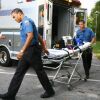I think there are two main problems with replacing ABC (Airway, Breathing, Circulation) with MARCH (Massive bleeding, airway, respiration, circulation, hypothermia) in a civilian/urban setting.
Mechanism of injury and availability of advanced treatment
On the battlefield, truly massive (i.e. immediately life-threatening) bleeding is far more common than in a typical urban (or even wilderness) setting. In particular, amputations (from IEDs) just aren’t that common in your typical American city. “Bleeding out” from an amputated limb or a major artery will quickly cause respiratory and circulatory distress, but you need to prioritize treating the cause of the distress - the bleeding - above the symptoms if you hope to save the patient. By contrast, in an urban setting (with the possible exception of a car crash), cardiovascular emergencies are far more common to be the cause of first aid (civilians aren’t as young or healthy as soldiers). Even in the cases of major trauma, the ready availability of advanced life support (e.g. an ambulance or ER) make it extremely unlikely that a patient will “bleed out” before reaching a place where he can receive a blood (plasma) transfusion. In other words, unless a patient is bleeding from his femoral or carotid artery, massive bleeding just isn’t as important in urban first aid, and can be handled once the pros arrive. On the other hand, a blocked airway will cause death before the paramedics arrive.
Difficulties with inexperienced civilian first responders
If first responders were perfectly trained, the protocol for prioritizing care (ABC or MARCH) wouldn’t affect the care the patient received: the “best” responders will apply their judgment and prioritize the biggest problem. Of course, most responders don’t have a lot of experience to draw from, and therefore can’t be expected to do anything but follow the protocol they know, or at least the one they remember.
I don’t have any research at hand, but I’ll go off anecdotal evidence that civilians on the whole are poor judges of what constitutes “massive” bleeding... I cracked open my head 5 years ago and was amused at my friends’ reactions to the blood and their concern that I would bleed to death if I didn’t get to a hospital. Had I been unconscious with a blocked airway, I could have choked to death while my friends applied pressure to the top of my skull to stop what they perceived as “massive” bleeding.














